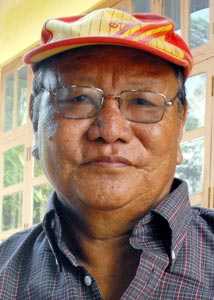Name: Tsewang Norbu
(Alias: No)
Gender: Male
Interview Age: 66
Date of Birth: 1944
Birthplace: Phuma Changthang, Utsang, Tibet
Year Left Tibet: 1959
Profession: Herding
Monk/Nun: No
Political Prisoner: No

Interview No.: 50M
Date: 2010-04-06
Language: Tibetan
Location: Doeguling Settlement, Mundgod, Karnataka, India
Categories: Oppression and Imprisonment
Keywords: childhood memories, Chinese -- first appearance of, Chinese rule -- life under, customs/traditions, escape experiences, festivals, nomadic life, taxes, thamzing/struggle sessions, trade, Utsang
Summary:
Tsewang Norbu's family owned around 100 yaks and about 1,000 goats and sheep. They were among the richer nomad families. He gives information about the nomadic way of life, explaining that in winter they stayed in a proper house and lived in a tent during grazing time. They practiced the barter system, exchanging butter, cheese and meet for grains and peas with the farmers from a nearby region.
The chirim 'community prayer' was held annually where people from different nomadic villages assembled to pray, sing and dance. Another enjoyable occasion was when all the animals of Phuma Changthang gathered at the gangpu 'community land.' Tsewang Norbu describes the five levels of tax payers who had to remit taxes to the government for use of the grazing land. Every three years the government conducted an animal census of each family's herds.
Tsewang Norbu remembers seeing the Chinese first come to his village in 1957 to survey and photograph the area. Later in 1959 many people fled through their village and related the battles between Tibetans and Chinese. As the Chinese oppression increased, his uncle was beaten and then committed suicide and his father was imprisoned. Tsewang Norbu and siblings escaped from the grazing area leaving behind everything that they owned.
Interview Team:
- Rebecca Novick (Interviewer)
- Ronny Novick (Videographer)
- Namgyal Tsering (Interpreter)

